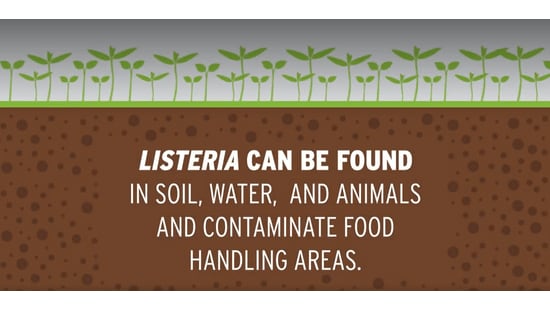Understanding Listeria
Ecolab SEA’s Innovation Deployment Manager, Food and Beverage, Florife R. Yasa, talks about listeria, a bacteria that causes one of the most serious types of food poisoning and is common to food processing plants. Flor tells us what Listeria is, its key points, and how Ecolab can help prevent it.

What is Listeria?
First, the technical explanation: Listeria monocytogenes is a pathogenic bacterium that causes listeriosis, an illness that usually comes from eating listeria monocytogenes-contaminated food. Listeria Monocytogenes is most found in improperly processed deli meats and dairy products. Listeriosis has Flu-like symptoms like fever, muscle aches, nausea and diahrrea but it can also spread to the nervous system with headaches, stiffness, confusion and convulsions. Listeria primarily affects pregnant women, newborns, older adults and people with weakened immune systems.
The listeria bacterium is notoriously difficult to fight because it can survive in a wide range of conditions, including refrigeration, freezing, and other food preservation measures. Listeria Monocytogenes can grow at refrigeration temperatures (-4 to -10°C), which means refrigerated foods are still at risk, and pH conditions ranging from acidic to basic (4.4 - 9.2). It can also withstand dry circumstances with a water activity of less than 0.92 and saline water, such as in a nine percent brine solution at 12°C. Listeria is more resistant to sanitizers (QAC, POAA) than free floating cells because it forms biofilms with other bacteria, which makes it difficult to kill and remove from surfaces. This is all by way of saying that listeria has an uncanny ability to adapt to its surroundings.
Next, the negative impact: Listeria contamination can be a nightmare for food production facilities. In 2021, disease caused product recalls involving kimchi, turkey sandwiches, enoki mushroom, ice cream, cream cheese, smoked fish dip, fish products, cherry juices, cheese products and ready-to-eat (RTE) chicken. In the US and Canada, the Food Safety and Inspection Service (FSIS), working in partnership with the Center for Disease Control and Prevention (CDC), the Canadian Food Inspection Agency (CFIA), and the Food and Drug Assocation (FDA), as well as other national food agencies, recorded more than 3.86 million kilograms of RTU chicken in one incident.1
As per CDC, an estimated 1,600 of people get listeriosis every year, and 260 of those die.2
Where can Listeria in food production facilities be found?
In short, everywhere. Listeria thrives in just about any damp environment, especially wet, dark places like floors and floor drains. Along with food contact surfaces, look out for listeria in:
• Cleaning aids such as brushes, sponges, etc.
• Product and/or equipment wash areas
• Condensate
• Walls and ceilings
• Compressed air
• Coolers
How can listeria spread in food processing facilities?
There are a multitude of ways listeria finds its way into plants. It can come in with raw materials, raw product to be processed as well as packing, pallets, etc. Listeria contamination can enter with vehicle tires, rolling stock and foot traffic, moving into sensitive areas such as filler rooms, pack lines and RTE sensitive places.
In dairy plants, it has been verified that listeria can grow in both condensed or standing water or pasteurized milk, in part because of longer refrigeration times.
Humans can unwittingly spread the bacteria with soiled footwear and improper hand hygiene. It is believed that approximately 10 percent of the general population carry the pathogen.
How can we prevent listeria in your plant?
We, in Ecolab help our business partners effectively manage the risk of listeria monocytogenes contamination in their plants, thereby avoiding expensive product recalls, illness (even death) and a negative reputation. We assess our customer’s facilities for potential listeria-related issues, and establish standard cleaning and sanitization processes for drains, surfaces, and other listeria-prone areas. It may also mean providing technical and awareness training and customized hygiene plans. One of the best ways a plant can protect itself and ensure the safety of others is to take a proactive approach to plant sanitation. Ecolab is here to help.
Contact Ecolab at FoodBeverageSEA@ecolab.com or contact your Ecolab Representative for a listeria audit of your plant.
1 See https://www.cdc.gov, https://www.fda.gov
2 See https://www.cdc.gov, https://www.fda.gov



